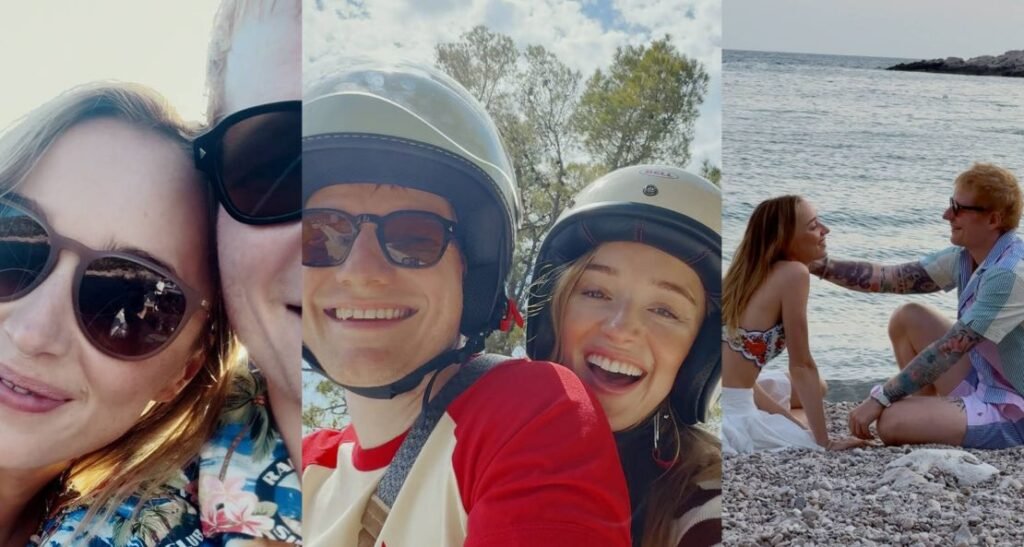Ed Sheeran has always written like someone who can freeze a moment mid-breath, and “Camera” is that instinct turned into a thesis.
The song lands with Play (Extended Edition) and its official video on September 12, 2025, the same day he unveils the album; an elegantly timed reveal that treats “Camera” as both single and statement.
He writes it as a vow disguised as a pop chorus. The hook, “I don’t need a camera to capture this moment / I’ll remember how you look tonight for all my life,” frames memory as better than film, then keeps doubling down with image-rich specifics.
“When everything is black and white, your colour’s exploding,” “You’re frozen in motion, a perfect picture in the frame,”and a bridge that promises to hold “every little detail in the fabric of the night.”
The lyrics carry the whole idea: some visions don’t fade, and love is the only lens that matters.
“Camera” is written by Ed Sheeran, David Hodges, Andrew Watt, and Louis Bell, with production from Sheeran, Watt, ILYA, and Bell.
An A-list pop room whose fingerprints you can hear in the warm low-end, the soft-focus piano, and the vocal treatment that keeps Ed up-front while the chorus blooms around him.
The arrangement never fights the lyric; it’s built like a keepsake box, not a stadium battering ram.
The video makes the metaphor literal without getting corny. Sheeran casts Bridgerton’s Phoebe Dynevor opposite himself and, instead of dipping into private home movies, recreates “a few key moments” from his relationship.
First dates, late-night wanders, a stage cameo shot entirely on iPhone and directed by longtime collaborator Emil Nava.
His reasoning, posted directly to fans, is disarmingly plain: “My original Camera music video idea was using private home footage of mine and Cherry’s key moments… but we are an intensely private couple… so I recreated a few key moments… with the wonderful Phoebe Dynevor… It was all done on iPhone, and directed by the wonderful Emil Nava.”
That’s the “why” and the “how,” and it tracks with what you see on screen.
There’s travelogue romance threaded through it. Multiple outlets place the shoot on Croatia’s Dalmatian coast, Hvar, Split, old-town alleys, and seaside light, plus a wink of live-show footage, which lends the clip that head-spinning “new love on tour” energy.
It’s not a documentary; it’s a re-enactment with cinematic tidiness, right down to a closing detail that watch nerds clocked instantly: a one-off, pink-dial IWC Big Pilot’s Watch that flashes in close-up, tying the colour palette back to Play and, frankly, giving horology blogs something to dissect.
As a piece of writing, the song splits into three clear moves. First, the still frame: “You’re glowing in the dark… a perfect picture in the frame.”
Second, the promise to remember: “I’ll remember how you look tonight for all my life.”
Third, the post-flash aftercare in the bridge, when the camera flare fades, he’ll “keep holdin’ on to every little detail.”
The refrain “I don’t need a camera when you’re in my eyes” does the double duty of title payoff and thesis recap.
It’s not complex poetry, but it lands because it’s conversational and sung like a secret you’d actually say.
Context helps the song make more sense inside Play. Press around the album paints a picture of a record that balances family-and-grief confessionals with unabashed love songs.
People, for instance, frames “Camera,” “Slowly,” and “The Vow” as the celebrations in a set that also stares down sickness and loss.
That dynamic is why “Camera” feels placed, not generic, as it’s the bright photograph tucked between heavier pages.
Our read on how it plays in the world breaks into two honest columns.
In the plus column, it’s immediate and pretty, produced with the kind of modern classicism that flatters Ed’s register and dodges trend-chasing.
Several reviews of Play highlight its love songs as the album’s emotional centre, with some calling “Camera,” “The Vow,” and “For Always” the keepers.
In the minus column, “Camera” can be perceived sappily sweet, or at least safe within Sheeran’s familiar comfort zone, proof, for detractors, that the grander claims of experimentation on Play sit mostly elsewhere. Both threads exist at once, and both feel fair.
Pop-culture ripples arrive fast with an Ed Sheeran single, and this one generates a few. Phoebe Dynevor’s casting pulls in the Bridgerton crowd and sets off the usual “is this autobiographical?” discourse.
The iPhone production choice keeps the “Shot on iPhone” conversation alive beyond Apple’s own marketing; the IWC cameo adds a luxury-objects subplot.
None of that moves the song’s meaning, but it does explain why the video rockets through feeds outside the usual Ed bubble.
Final frame: not a tell-all on tape, but a re-creation with boundaries. Phoebe Dynevor stands in, an iPhone stands in for the film crew, and Emil Nava stitches a holiday’s worth of scenes into one memory the audience can share without opening the family album.
The promise isn’t that he’ll show everything; it’s that he doesn’t need to.
“Camera” chooses discretion and still lands as true, because the feeling is real, even when the footage is staged.
You might also like:
- Ed Sheeran “A Little More” – breakup bite with a dance-floor lift
- Ed Sheeran “Photograph” – love, distance, and memory, decoded
- Ed Sheeran “Lego House” (2025 read) – metaphor and legacy
- Ed Sheeran “Azizam” – affectionate tribute and cultural nods
- Ed Sheeran “Old Phone” – acoustic reflection on memory and regret
- “Thinking Out Loud” – enduring vows and slow-dance classic, revisited


